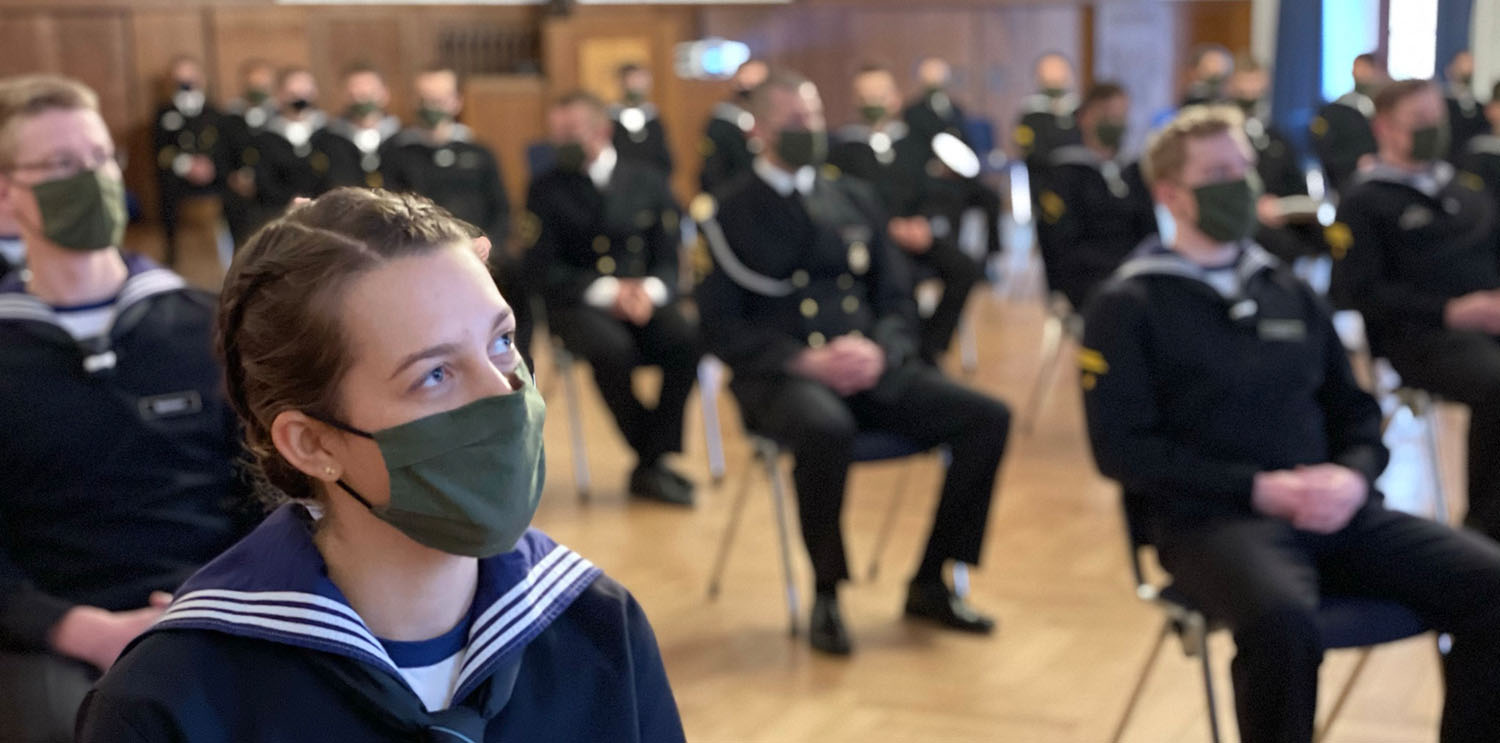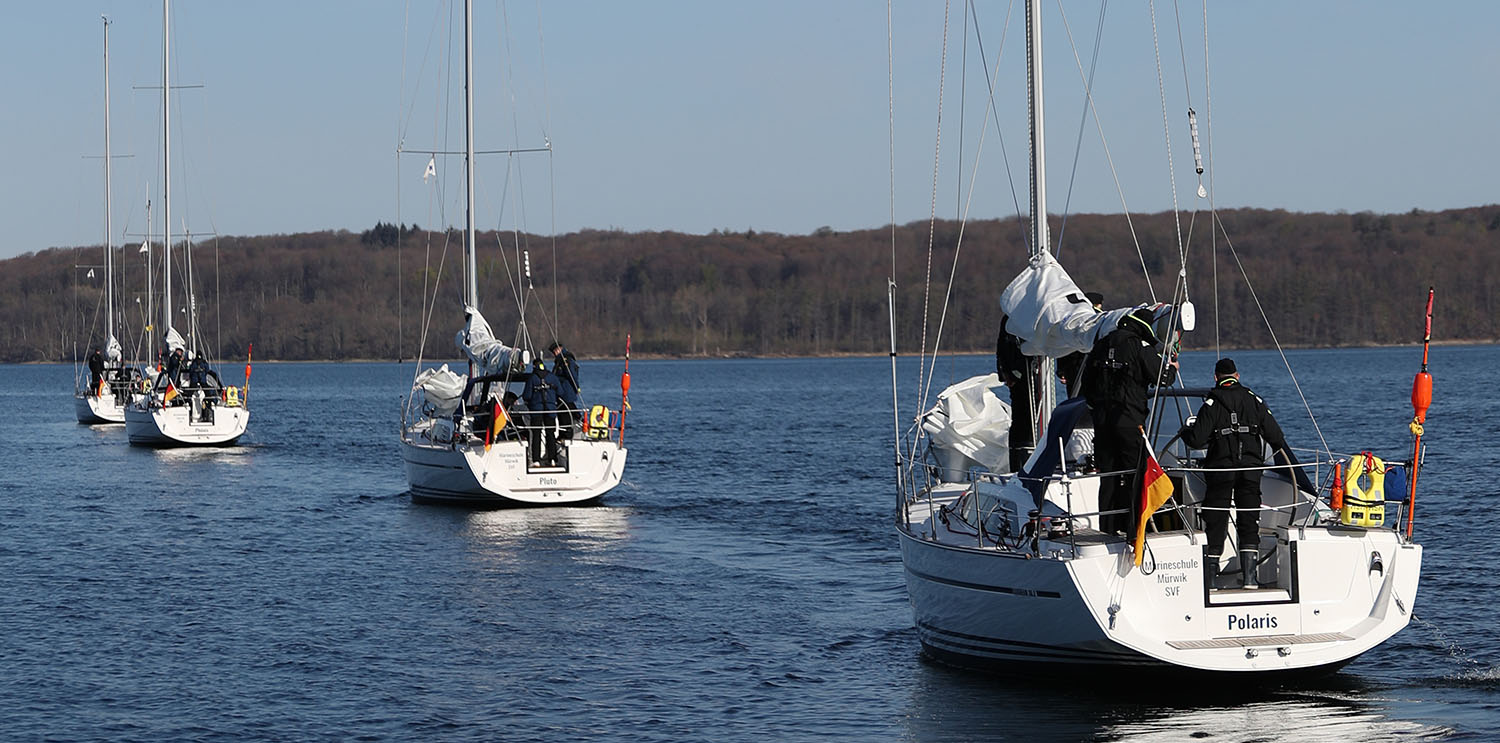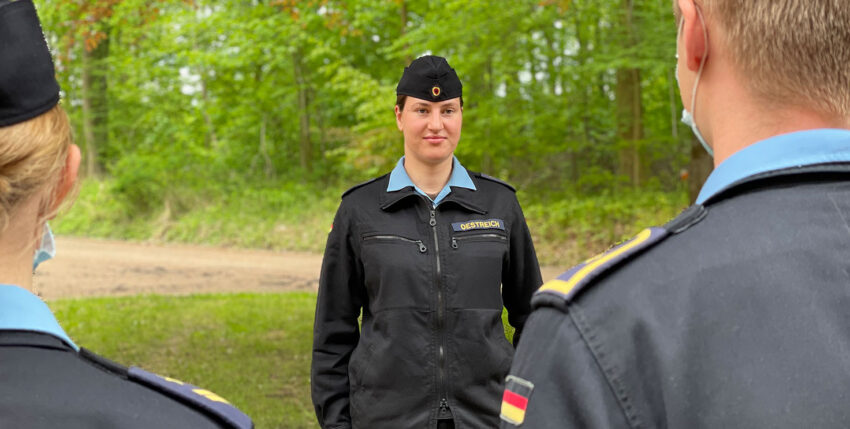Leadership is at the centre of training at the Mürwik Naval School. The aim is to inspire officers and officer cadets for their future work by focussing largely on practical experience. The manoeuvre whistle blows loudly through the harbour shortly after the departure and safety briefing has been held at the manoeuvre stations. The ship sets sail in accordance with theeparture order. After passing the pier heads, the division commander signals the first change of formation for the keel line with 14 units. At the same time, young naval officers are sweating on the bridges of their units, holding their navigator's notebooks in their hands and applying their knowledge of navigation in dense fog. blind pilotage on. Other young officers are looking intently at their laptops at this moment. They are connected to the British Royal Naval College in Dartmouth and are intently following the leadership lessons by a former British commodore who served on the HMS Coventry, which was sunk during the Falklands War. The captivating theme is: "What attributes should an Officer show during Battle Action?"
Scene 1 reflects the military sailing training at the Mürwik Naval School reflected. The aim is to familiarise our officer candidates with the sea and to ensure that their training is as close to the fleet as possible at an early stage. The fleet's standards will therefore be applied to the seven brand-new Sunbeam sailing yachts and the tried-and-tested Hanseats.
Scene 2 describes the final examination of the participants of the Officer of the Watch course, the flagship of nautical training, in one of the most modern ship handling simulators in Europe. The sea voyage with examination character takes place in the nautical ship handling training equipment (AANS), which was completely modernised in 2018, as fleet units are not available.
Scene 3 is part of the post-university leadership course. The Falklands War is addressed not only in military history, but also in the subject of leadership theory and conveys combat experience from the most recent three-dimensional naval war.
The scenes described are just three facets of a large number of training elements that pursue the goal of shaping the next generation of leaders in the German Navy from day one, developing leadership expertise and introducing the course participants to the demanding tasks of their first post as their training progresses. Leadership is the core topic that forms the basis of every single course at the Naval school is the core competence. Nautical science is the second core competency that is taught at the Naval school is taught at different levels. The practice-oriented watch officer course for future bridge officers is at the centre of this.

Leadership at the centre of all courses
Training in the area of leadership skills is not determined by the mere transfer of knowledge. From the very first day, the future officer should be moulded in a maritime way and inspired to serve in the navy. In addition, wherever possible, they should be confronted with their role as a future superior through action- and competence-orientated training. Only by doing so will the men and women acquire competences in the area of leadership and the practical fields of application of Innere Führung.
Already in this first phase of training, the officer candidates are required to internalise the fundamentals of the military leadership process. The aim is to train and shape the future military leader in terms of their personality, sense of responsibility and will to lead, their power of judgement and their professional skills. Even if only at a rudimentary level, officer candidates are already confronted with simple tactical situations that require them to make decisions, plan and give orders based on structured and systematic thought processes. In addition, basic legal knowledge is taught in the career courses for officer candidates in the troop service and the specialised military service.
The post-university leadership course is then organised as a seminar. In the context of a staff position, the aim is to develop the ability to act as a military superior by applying the naval military leadership process, the basics of personnel processing and appraisal, the preparation of written orders, the application of military law and the deepening of Innere Führung. The British-German leadership seminar mentioned at the beginning should be seen in the context of the self-image as a military leader. For the first time this spring, participants in the leadership course prepared a digital conference largely on their own initiative. Based on a report on the experiences of a former watch officer in the Falklands War, the demands placed on naval officers by combat as the most demanding form of military leadership were discussed together with the commander of the fleet and his British counterpart.
Prospective disciplinary superiors, such as boat commanders, first officers and company and inspection commanders, receive further training in the unit leader course. In particular, disciplinary law for unit leaders, personnel management and the appraisal system are deepened there.
The highest level of advanced training for superiors at the MSM is the commander course. Its objective is to develop a cross-level understanding of leadership within the navy. Here, future ship commanders, squadron and training group commanders receive further training for their tasks within the seminar framework. The focus is on the fields of leadership, military law, personnel management and press relations. The Mürwik Naval School emphasises the need to prepare all future leaders not only for international crisis management operations, but also for multidimensional naval warfare, which will later be taught on specialist courses and during further training in the fleet.
Crews are becoming more heterogeneous
The Naval school forms the outer framework for a unique selling point within our armed forces: in each recruitment year, a special bond of life develops that stands for camaraderie, friendship and professional networking: the crew. Of course, this crew concept only comes to life if it is developed and brought to life with commitment. The heterogeneous composition of our current officer candidate crews poses challenges for the desired crew spirit. The days when all members of a crew started their officer training at the age of 19 are long gone. In the 2021 crew, one third of which started their service at the beginning of July, one third in mid-August and one third in early October, the age range extends from 17 to 45.
There is also a spread of ages and ranks in the officer training programme of the Military Specialist Service, from 27 years to 52 years, from midshipman to chief petty officer OA. This greater diversity enriches our navy. However, it does not make the formation and development process of a crew any easier and places particular demands on superiors in officer training.

Little time on board
Whereas in the past, future military officers were embarked for up to 20 weeks before their studies and were thus able to experience the sea and seafaring on board, today's officer candidates often only have two to four weeks to do so. Bringing the sea dimension to life is a challenge for the Mürwik Naval School. The reasons for this are obvious: several years of absence of the Gorch Fock sail training ship, no destroyer exercise, no operational training unit or training squadron for many years and a low availability of ships and boats in the fleet that could enable OAs to complete a sea-based internship in the summer quarter. There are 15 months available for the desired characterisation and training before most officer cadets in the military service embark on a four-year course of study at one of the Bundeswehr universities. There, the young comrades will develop significantly, mature and also develop individual and possibly new ideas for their careers. For this reason, they can only be moulded as a crew before their studies and with the experience of the sea. In order to achieve this goal, the Naval school pre-university training with as many practical elements as possible and as few theory lessons in the lecture theatre as possible. We endeavour to apply the standards of the fleet with the military sailing training. The service sailing boats are used as force multiplier used. In addition to teaching sailing skills, individual facets of service in the fleet, including command and reporting language, on-board ceremonial, standardisation, procedural discipline, briefing culture, are consciously practised on board the sailing boats. Mistakes can be made here. In addition, the Naval school The aim is still to realise embarkations on board units of the fleet whenever possible. The aim is to develop job profiles such as bridge watch officer, ship technology or IT officer and to initialise a link to future military home units (Operational Flotilla 1 or 2, Naval Air Command).
Digital training
Generation Z, the digital natives, are challenging naval instructors with their established methods. There is a tension between modernising training - often using digital methods - and at the same time preserving the necessary and proven characteristics of our navy.
In spring 2020, it became necessary to create a "digital MSM" at short notice in order to meet the particular challenges posed by the onset of the coronavirus pandemic. This created a positive momentum of its own and high pressure to innovate. The MSM now has a digital learning management system (LMS) that enables teachers and training participants to access training content regardless of their location. All training participants can be equipped with modern, mobile IT. This process will continue regardless of how the pandemic develops. Digitalised training will thus become a long-term addition to traditional knowledge transfer and awaken new potential.
Learning to lead as a continuous process
From the sailor OA to the frigate captain, everyone meets at the Naval school Officers and those who want to become one. They are connected in their learning world by the topic of leadership. Back to the opening scenes. At the same time as the manoeuvres in the boat harbour and the blind pilotage training in the AANS, young officer candidates are standing in front of a smartboard in the large training room in the MSM tower and listening to an excited crewmate's lecture on the electronic nautical chart. One deck below, prospective ship commanders and commanders discuss contemporary leadership with the commander of the Centre for Internal Leadership, who is leading this part of the seminar as a guest lecturer. Only a few metres separate the two learning groups. However, their daily service, leadership experience and expertise could not be more different. Nevertheless, they are closer than initially assumed. Leadership requires holistic thinking, communication, the ability to deal with conflict, empathy and much more, and remains a formative and inspiring task. Even the more experienced group in the assembly hall does not claim to have learnt the ropes. Nobody is born a commander. Learning to lead as a continuous process that is challenging and participant-orientated, while inspiring and shaping enthusiasm for service as a naval officer, is the fulfilling challenge for the Mürwik Naval School.
Kapitän zur See Kurt Leonards is Head of Teaching and Commander of the Training Group, Korvettenkapitän Udo Sonnenberger is Teaching Staff Officer for Defence History at the Mürwik Naval School.
Photos: Bundeswehr/Björn Wilke











One Response
"Specialist officers" come to the MSM with the prerequisite SgTechniker/Betriebswirt.
It should be suggested that further military training to become an officer be recognised for a Bachelor's degree course.
This is possible in the staff officer courses at the Command and Staff College for the Master of Protection and Security at the BW-HS Hamburg.
What is possible for staff officers should also be feasible for specialised officers.